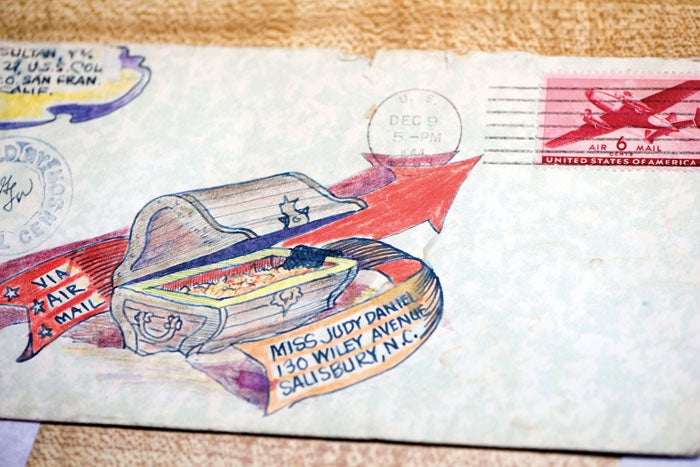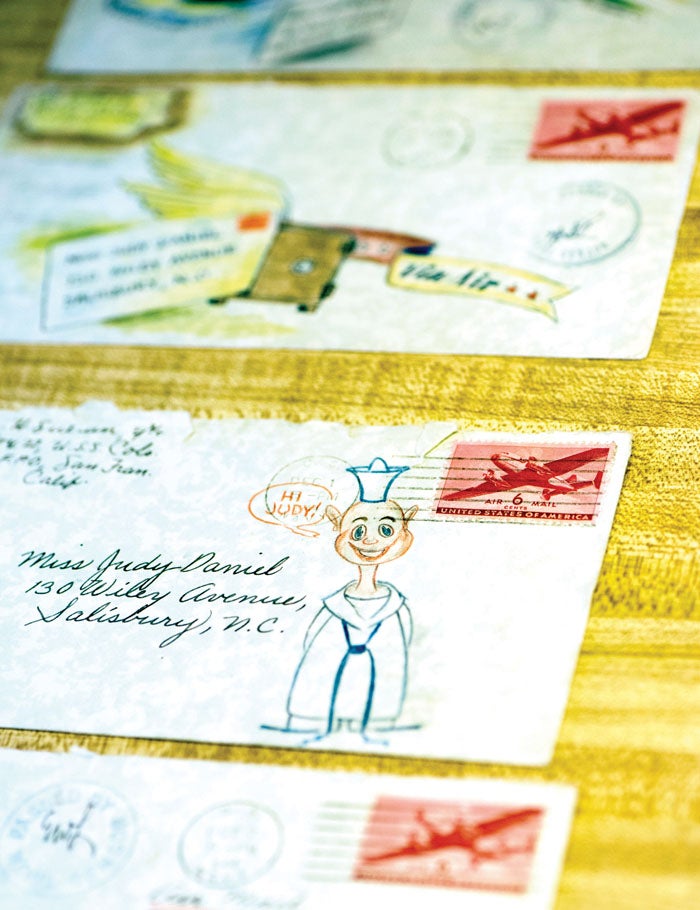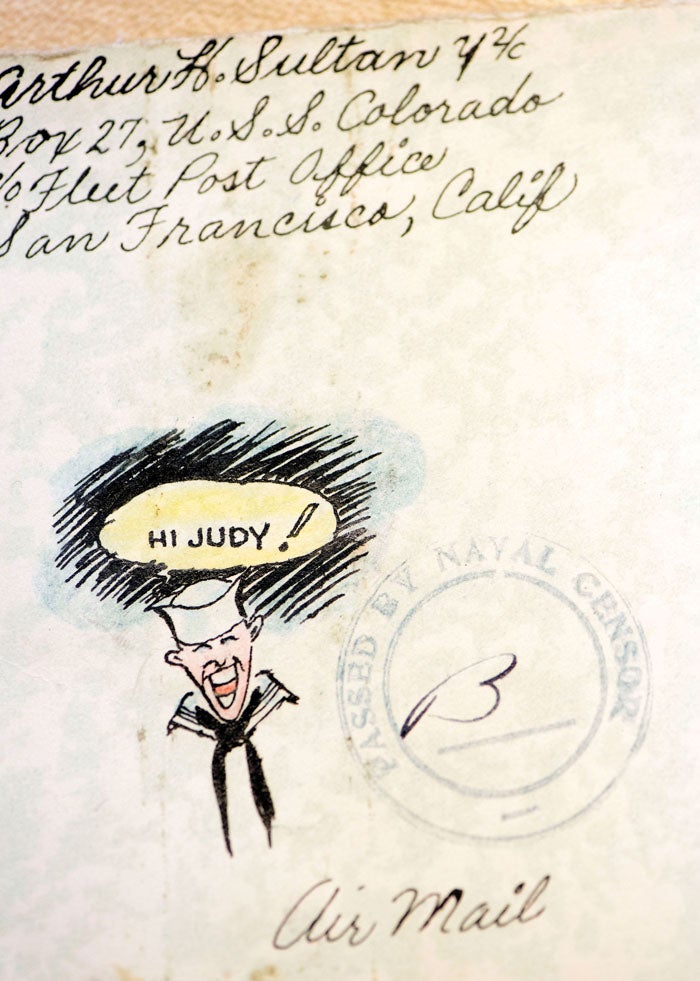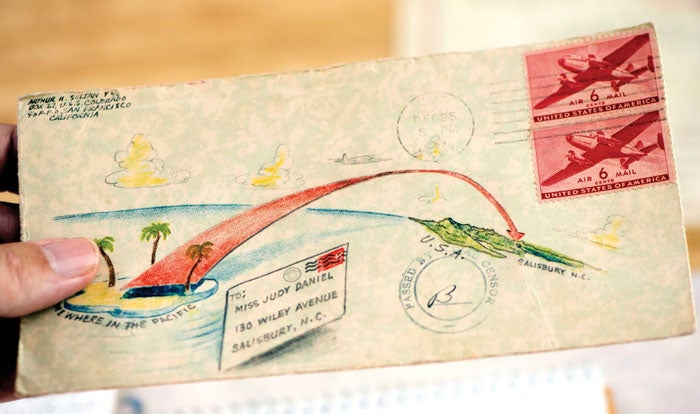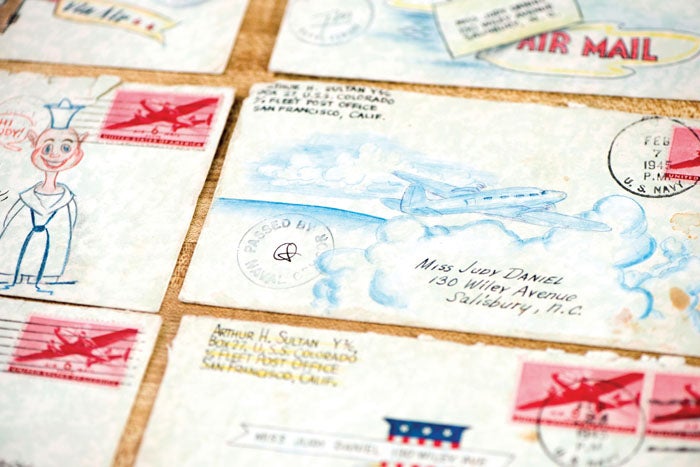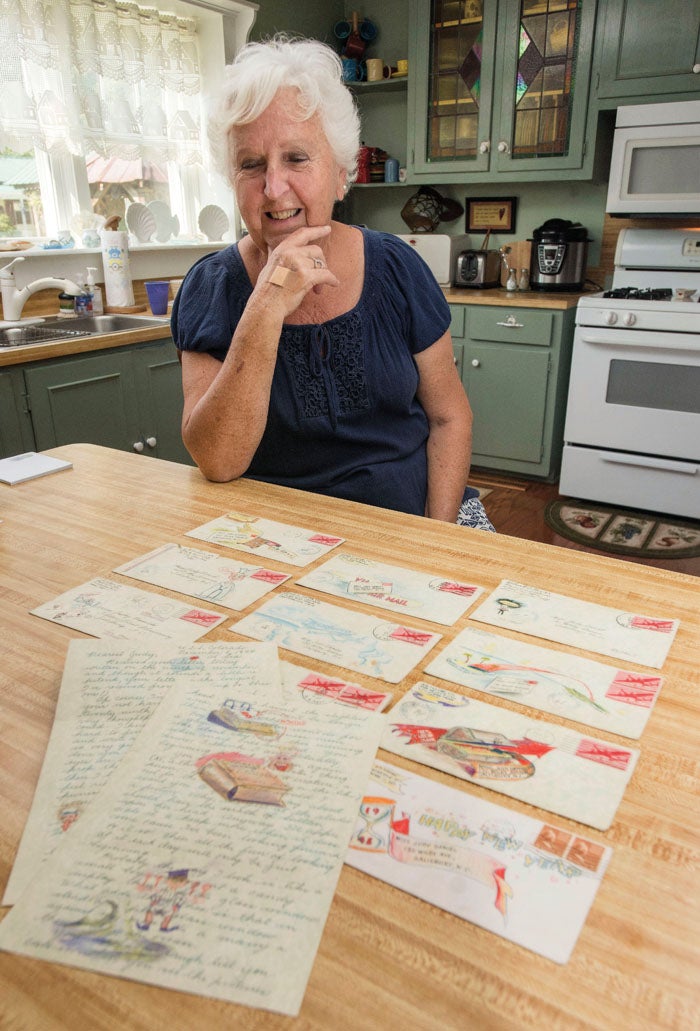Artful correspondence: During wartime, a sailor sent colorful letters to a girl back home
Published 12:00 am Wednesday, September 20, 2017
ROCKWELL — Julia “Judy” Daniel Corriher died in 2013 when she was 89, and the duty of sorting through her Salisbury home on Holmes Street — she was a pack rat of sorts — fell to niece Carole Hopkins.
Carole found the envelopes stuck in a drawer in Judy’s bedroom. They clearly were all from Arthur H. Sultan, a yeoman on the battleship USS Colorado, fighting in the Pacific during World War II.
There were 10 envelopes in total. Nine carried postmarks from October 1944 through February 1945. One other letter had been sent at the end of 1948 from Baltimore. All of them were addressed to Judy Daniel in Salisbury.
The fronts of the envelopes contained illustrations done in colored pencil. You could tell that Sultan, who had drawn them, was talented.
He drew pictures of sailors saying “Hi Judy!” Or planes in the clouds were meant to remind her the letter was coming to her by airmail. On one of the envelopes, he drew an island in the Pacific and the path by air the letter would take to Salisbury, N.C., which he represented on the other side of the envelope.
Elsewhere, Judy’s name and address were attached to a treasure chest. The envelope from the 1948 letter from Baltimore included a happy new year’s greeting. They all had a professional look to them.
“He was an excellent illustrator, wasn’t he?” says Carole’s husband, Robert.
Were the drawings the reason her Aunt Judy had kept the envelopes? Carole didn’t know. After she and Robert came back to their native Rowan County in 1987 from many years in Charleston, South Carolina, Carole reconnected with Judy, and they became close.
But Judy had never mentioned the seaman named Sultan. “I wish she would have told me about him,” Carole says.
Mixed in with the colorfully drawn envelopes was a single letter from Sultan of four pages. It was dated Dec. 5, 1944, and Sultan put his location as “at sea.” He also had illustrated the letter.
As he was talking about time, he drew an hourglass. At one point he was defining a word, and he included his drawing of a dictionary. When he said he was just joking, he drew the face of a guy laughing.
When he called her “honey,” the picture was a beehive. He sketched a foot when he apologized for putting his foot in his mouth. As he spoke of sending a picture of himself to her taken buy the ship’s photographer, he drew, of course, a photographer.
At the end of the letter, Sultan signed off by writing, “Bye now, oodles of love n’ kisses, Arthur.” Instead of “love,” he drew a heart; instead of “kisses,” he sketched some lips.
Sultan had invented emojis 73 years ago.
“Don’t your ears burn sometimes?” Arthur also wrote toward the end of his letter. “They say they’re supposed to when someone’s thinking of you.”
Carole has no idea how serious her aunt was with Sultan. Were these love letters, or were they just friends in wartime corresponding with each other?
It’s obvious from the things Sultan wrote in the one letter Judy had saved they had been writing to each other often. “Boy, what a letter won’t do for a guy’s morale,” Sultan said. “I guess mine was about sky-high this morning when mail call sounded. You know, I think I am actually beginning to feel human again.”
Sultan was still waiting to receive a photograph of Judy. “I’ve been looking forward to it so,” he said. “You probably laugh until you cave in when you see the pictures I sent you. … Gee, I hope I get another letter from you, or the picture, so I would have an excuse to write you again.”
Sultan wrote he had read all seven of Judy’s letters again before the latest one arrived that morning.
The bottom line is Arthur and Judy went their separate ways. They were four years apart at Boyden High School, and Carole has a theory they might have met at Fulton Street Pharmacy, where Judy worked.
Before he enlisted in the Navy on May 28, 1940, Sultan worked at both N.C. Finishing Co. and the Oestreicher store in downtown Salisbury. He was a son of William H. and Rose Sultan, who belonged to Temple Israel.
Carole asks another question: Did the different religions of Arthur and Judy — she was a lifelong member of Park Avenue Methodist Church — present a roadblock for them? Again, she’ll never know.
According to the newspaper’s files, Arthur and his battleship participated in nine major engagements in the Pacific. He saw action at Tarawa, Tinian, Guam, Saipan, Mindoro, Leyte, Luzon and the Lingayen Gulf.
He stayed in the Navy until May 28, 1946, a period of six years and a day.
The local newspaper kept up with Sultan for only a little while longer.
A brief story from Dec. 1, 1946, headlined “Commercial Artist Visiting Parents, ” noted Sultan was taking advantage of the GI bill to attend the Maryland Institute of Art.
When he wasn’t attending classes, the article said, Sultan was working at the Baltimore Sun as a commercial illustrator.
A May 11, 1947, photo and short story noted Sultan had won first prize for his futuristic costume at an artists’ ball at the art institute.
Sultan’s father, William, died in 1960. He had been employed a long time by Endicott-Johnson Shoes. In his father’s obituary, Arthur was listed as living in Washington, D.C., at the time.
Carole Hopkins says her own online digging shows that Arthur died in Annapolis, Maryland, in October 2005, having had two wives and no children. A similar story played out for her Aunt Judy, who was married twice and never had children.
Remarkably, Judy’s parents, George and Daisy Daniel, had 15 children — Judy was seventh in line in 1923. But she ended up being raised after a troublesome birth by Dr. Jim Ketchie and his wife, Bessie, on Wiley Avenue.
Judy graduated from Boyden High in 1942. She worked for Duke Power Co. for 30 years until retiring in 1984.
It’s interesting, but Carole Hopkins ended up marrying Robert, a 30-year Navy man, and she became part of the U.S. Navy Reserve herself.
She wonders now how often her Aunt Judy’s ears burned because of that other Navy guy long ago.
Contact Mark Wineka at 704-797-4263 or mark.wineka@salisburypost.com.


